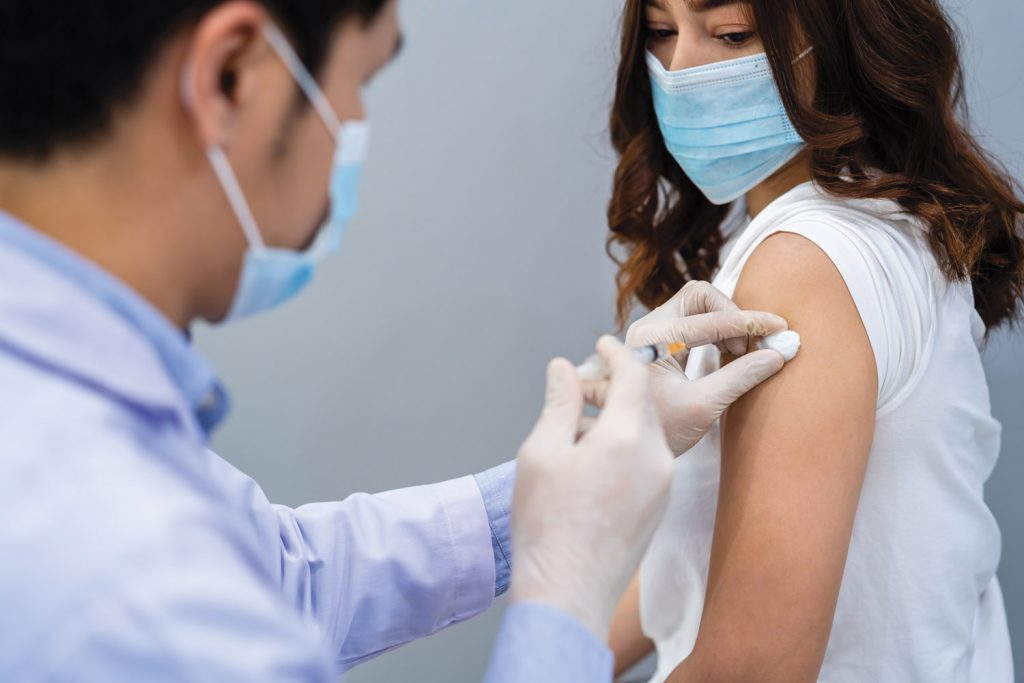A Long Shot
While employers may encourage or incentivize vaccinations, they are unlikely to make them mandatory.
 As the COVID-19 vaccine rolls out to more people as they become eligible, many are wondering if the shot could become a requirement in the workplace, but the bigger question is: Should it?
As the COVID-19 vaccine rolls out to more people as they become eligible, many are wondering if the shot could become a requirement in the workplace, but the bigger question is: Should it?
By law, employers are permitted to mandate a vaccine, and it’s common in professions where people put themselves at risk daily. Health care workers are typically required to receive the flu vaccine annually, for instance. However, vaccine policies are not common in most private companies.
That’s always been the case at Wild Florida, says co-owner Sam Haught. “We don’t force anyone to vaccinate against anything else and don’t see a reason to start with COVID,” he says.
“I have personally not seen vaccination policies for any prior private employer before (other than health care employees)—that would be very unique. Mandatory vaccines pose a number of issues for employers, and thus far there is very little guidance,” says Robyn S. Hankins, chair of the Florida Bar’s Labor & Employment Law section. “While a mandatory vaccine for front-line workers (think grocery store attendants, service professionals who interact extensively with the public) may be approved, it would be a much harder sell to mandate a vaccine for someone who has limited or no contact with customers, or someone who works in an office alone all day. There’s also the consideration of other employees and what types of interactions between employees is essential for the worker.”
Any mandate must also comply with laws, including the Americans with Disabilities Act (ADA) and Title VII of the Civil Rights Act of 1964, and contain exceptions for those protected by these laws. Christy L. Foley, Esq., a visiting lecturer at the University of Central Florida’s department of legal studies, says exceptions have to be in place to comply with these laws and employers must make reasonable accommodations for those employees.
“For instance, if you are someone whose doctor told you not to get the vaccine because of the likelihood of a severe reaction, you can get a medical exemption and the employer would need to make a reasonable accommodation, such as a continued remote work option.” Foley says. “It’s also important to note that if someone claims a religious exemption, the law is written that it must be a ‘sincerely held’ religious belief.”
Having a clear, detailed policy in place is imperative, she adds. “I would recommend they speak to a business attorney, someone who would help figure out the best way for their business to roll out any policy.”
Hankins agrees. “This is a quickly expanding area of law and each employer is going to need to make educated guesses as we navigate these uncharted waters. I definitely would recommend anyone considering these issues for their workplace contact an experienced employment attorney,” she says. “There are just so many facts that must be considered for each situation and any misstep could prove very costly.”
However, on the other side of the coin is the liability of not mandating. If an employee or customer contracts COVID-19 traced to the business, it could be framed as an Occupational Safety and Health Act (OSHA) hazard. “I think we live in a litigious society and some people might try to sue if they go back to work and get COVID and there are no vaccine requirements, but [wehter] they are successful is a whole different question,” Foley says.
She suggests specific industries such as hospitality, shipping and even entertainment may roll out the mandate as part of their insurance policy. “Right now there are no concerts, but you may see insurance providers require things like this for a crew that travels with an artist,” she says.
Considering all of these risks, employers may choose to encourage or incentivize employees to receive the vaccine. Nationwide, companies have announced compensation either monetarily or with paid time off for employees who get vaccinated.
“Messaging is important. Employers should present the vaccine as a way to create a safe environment, and there are ways to incentivize it as well,” Foley says.
Locally, Publix is offering its associates a $125 gift card after they have been fully vaccinated, but it is not a mandatory requirement. “We care about our associates and customers and believe getting vaccinated can help us take one step closer to getting back to normal,” said Publix CEO Todd Jones in a statement. “We’re encouraging our associates to get vaccinated when they become eligible and doses are available.”
Vaccine access, or lack thereof, also has a place in the discussion. Until the general population has access after the segments of the most vulnerable, there doesn’t seem to be a sense of urgency. However, it goes without saying that many people who are going to work daily want it sooner than later.
William Hess, hospital manager at Winter Park Veterinary Hospital, says having his staff vaccinated would absolutely make them feel more comfortable coming to work every day as they provide critical care to pets in the area. “While our safety protocols have prevented any internal spread of COVID-19, the knowledge that we are still unvaccinated remains an ever-present worry. Vaccination is the only means to moving toward some semblance of normalcy,” he says.
Although they are essential, veterinary staff are not yet eligible for the vaccine, despite interacting with pets and their owners on a daily basis, as well as working in close proximity to each other. “I hope veterinary care teams will soon be eligible for the vaccine. We are medical professionals. Veterinary teams across the state and country have put their health at risk to care for our pet family members and they deserve to be vaccinated as soon as possible,” Hess says. “It is not up to me to determine how that decision is made, I can only advocate for the huge role we play in keeping pets healthy and the irreplaceable contribution pets make to the health and well-being of their owners.”
That said, Hess doesn’t envision mandating the vaccine and believes most employees would opt into it on their own accord. “I think most of our team members will be excited to get the peace of mind a vaccine provides.”
This article originally appeared in Orlando Family Magazine’s March 2021 issue.








